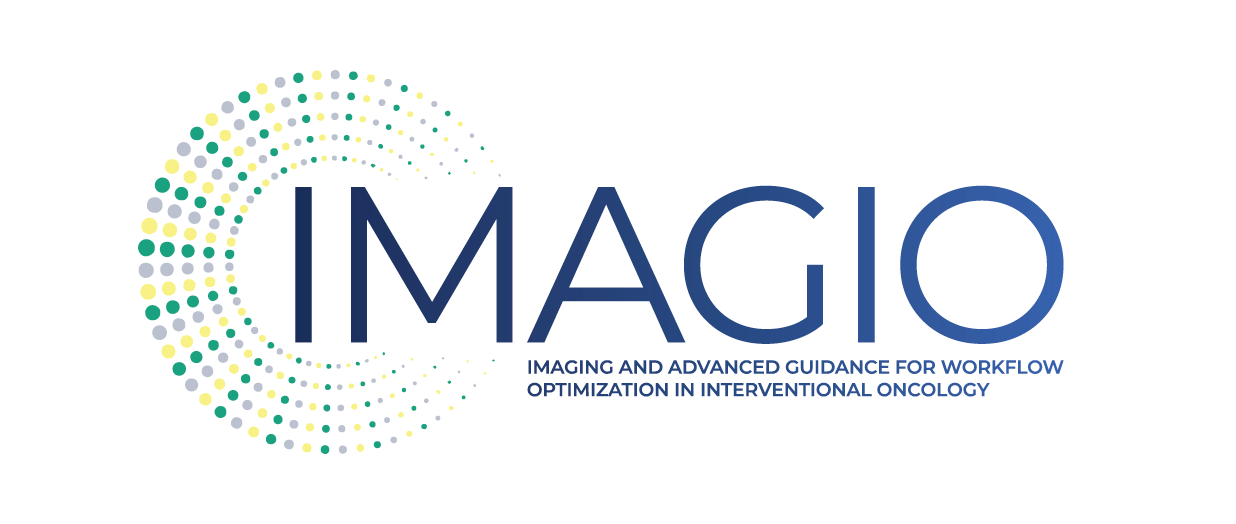Summary
Every year, over 2.5 million people in the EU alone are diagnosed with cancer, and cases are rising. The good news is that advances in treatments mean that survival rates are improving dramatically. Nevertheless, cancer remains a leading cause of death. Furthermore, while many current treatments are effective at killing off cancer cells, they also cause a lot of harm to healthy cells, tissues and organs, resulting in a range of serious side effects for patients.
The IMAGIO project focuses on an approach called interventional oncology (IO) which targets cancer cells more precisely, thereby sparing healthy cells from the toxic effects of many treatments.
In IO, miniaturised instruments (including biopsy needles, electrodes or catheters) are inserted into the patient’s body via minimally invasive access routes. The miniaturised instruments are guided to the tumour with the help of imaging techniques such as x-rays, ultrasound, computed tomography (CT) or magnetic resonance imaging (MRI). Once there, the treatment can be applied directly and precisely to the tumour.
IO can be used to deliver diverse types of cancer treatments, including surgery, radiotherapy, chemotherapy and immunotherapy. The IO approach offers multiple benefits for patients. In the case of IO surgery, damage to, and scarring of, healthy tissues is dramatically reduced and there is a much lower risk of infection and bleeding. For IO radiotherapy, because the treatment is applied directly to the tumour, radiation damage to surrounding healthy tissues is much reduced. This means a higher radiation dose can be used, resulting in a faster response to treatment. Similarly, for chemotherapy, the precise delivery of the treatment means that higher doses can be used because healthy tissues will not be exposed to the treatment. Finally, IO immunotherapy results in a strong immune response in both the primary tumour and any metastases.
IO approaches allow patients to recover faster while also cutting the cost of treatment.
IMAGIO will focus on three cancers: lung and liver cancer and soft tissue sarcomas. Lung and liver cancers are among the leading causes of cancer death. Soft tissue sarcomas are rare in older adults but are a major cause of death among those aged 14 to 29.
The project brings together representatives of the medical technology and pharmaceutical sectors as well as leading academic and clinical sectors. Together, they will explore and demonstrate how next generation IO imaging techniques can be applied to cancer research and treatment, from laboratory studies to clinical trials.
Achievements & News
April 2025
How can IHI and IMI projects harness the opportunities posed by real-world data and AI to make Europe a leader...
Participants
Show participants on mapMedTech Europe
- Flash Pathology B V, Amsterdam, NetherlandsSME
- Gremse-It GMBH, Aachen, GermanySME
- Johnson & Johnson Enterprise Innovation Inc, New Brunswick, United States
- Nanovi A/S, Kongens Lyngby, DenmarkSME
- NeuWave Medical, Inc., Madison, United States
- Profound Medical Oy, Vantaa, FinlandSME
Universities, research organisations, public bodies, non-profit groups
- Academisch Ziekenhuis Leiden, Leiden, Netherlands
- Cancer Patients Europe, Brussels, Belgium
- Eberhard Karls Universitaet Tuebingen, Tuebingen, Germany
- Eidgenoessische Technische Hochschule Zuerich, Zuerich, Switzerland
- Fondazione Irccs Istituto Nazionale Dei Tumori, Milan, Italy
- Klinikum Der Universitaet Zu Koeln, Koeln, Germany
- Siop Europe, Bruxelles, Belgium
- Stichting Radboud Universitair Medisch Centrum, Nijmegen, Netherlands
- Stichting Vu, Amsterdam, Netherlands
- Technische Universiteit Delft, Delft, Netherlands
- The Newcastle Upon Tyne Hospitals Nhs Foundation Trust, Newcastle-Upon-Tyne, United Kingdom
- Universitair Medisch Centrum Utrecht, Utrecht, Netherlands
- Universiteit Maastricht, Maastricht, Netherlands
- Universiteit Twente, Enschede, Netherlands
- Varsinais-Suomen Hyvinvointialue, Turku, Finland
Patient organisations
- Nederlandse Leverpatienten Vereniging, 's-Hertogenbosch, Netherlands
- Stichting Longkanker Nederland, Utrecht, Netherlands
COCIR
- Luxium Solutions, Saint-Pierre-Les-Nemours, France
- Philips GMBH, Hamburg, Germany
- Philips Medical Systems Nederland BV, Best, Netherlands
- Philips Medical Systems Technologies LTD, Haifa, Israel
- Profound Medical GMBH, Hamburg, GermanySME
EFPIA including Vaccines Europe
- Imaginab, Inc, Inglewood Ca, United StatesSME
- Janssen Pharmaceutica Nv, Beerse, Belgium
- Pfizer Inc, New York City, United States
- Pfizer R&D UK Limited, Sandwich, United Kingdom
EuropaBio
- Thermosome GMBH, Planegg, GermanySME
| Participants | |
|---|---|
| Name | EU funding in € |
| Academisch Ziekenhuis Leiden | 1 385 000 |
| Cancer Patients Europe | 174 119 |
| Eberhard Karls Universitaet Tuebingen | 511 500 |
| European Cancer Patient Coalition (left the project) | 93 756 |
| Flash Pathology B V | 150 000 |
| Fondazione Irccs Istituto Nazionale Dei Tumori | 100 000 |
| Gremse-It GMBH | 467 500 |
| Klinikum Der Universitaet Zu Koeln | 3 589 630 |
| Luxium Solutions | 463 000 |
| Nanovi A/S | 85 625 |
| Nederlandse Leverpatienten Vereniging | 87 644 |
| Philips GMBH | 1 074 040 |
| Philips Medical Systems Nederland BV | 5 668 325 |
| Philips Medical Systems Technologies LTD | 200 000 |
| Profound Medical GMBH | 222 097 |
| Profound Medical Oy | 1 033 198 |
| Siop Europe | 71 900 |
| Stichting Longkanker Nederland | 28 240 |
| Stichting Radboud Universitair Medisch Centrum | 3 049 106 |
| Stichting Vu | 150 000 |
| Technische Universiteit Delft | 1 185 863 |
| Thermosome GMBH | 1 308 195 |
| Universitair Medisch Centrum Utrecht | 1 284 225 |
| Universiteit Maastricht | 1 331 250 |
| Universiteit Twente | 417 875 |
| Varsinais-Suomen Hyvinvointialue | 175 000 |
| Total Cost | 24 307 088 |
